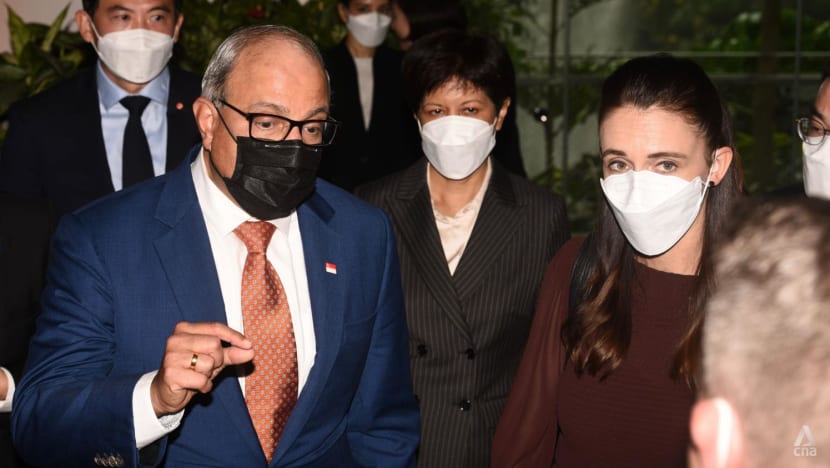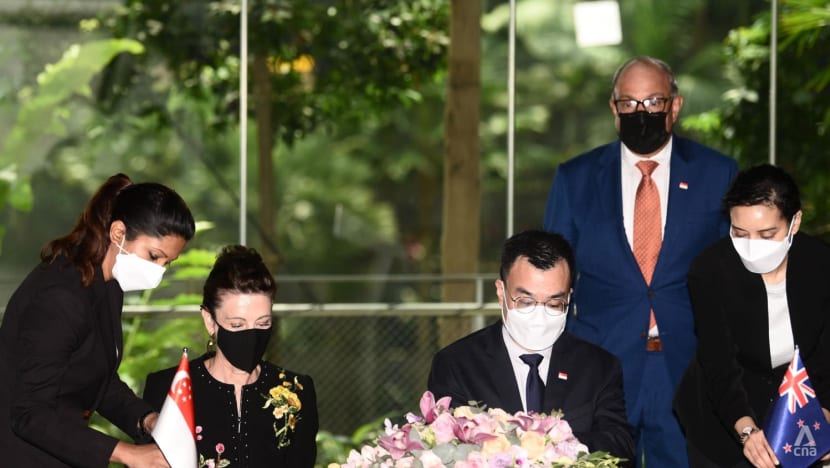Necessary for Singapore, New Zealand to redouble efforts on sustainable aviation: Iswaran

Singapore’s Transport Minister S Iswaran with New Zealand Prime Minister Jacinda Ardern at Jewel Changi Airport on Apr 20, 2022. (Photo: CNA/Marcus Mark Ramos)
SINGAPORE: Singapore and New Zealand need to redouble their efforts on sustainable aviation as they emerge from the COVID-19 pandemic, or risk having emissions rise as air travel recovers from the pandemic, said Singapore’s Transport Minister S Iswaran on Wednesday (Apr 20).
Mr Iswaran made the comments at Jewel Changi Airport, where he and New Zealand Prime Minister Jacinda Ardern witnessed the signing of an arrangement to work together on sustainable aviation.
Ms Ardern is in Singapore on a three-day visit to deepen cooperation in areas such as climate change and business links.
“If we fail to act, the sector’s emissions will rise in tandem with the post-pandemic recovery, and more than double by 2050 from 2019 levels,” said Mr Iswaran.
“This is clearly not tenable, neither for the sector nor for its wide range of climate-conscious stakeholders. It is also not viable for small, open economies like Singapore and New Zealand, which both rely on our connectivity with the rest of the world, for our economy and for our people.”
Pre-pandemic, international aviation accounted for 2 per cent of global carbon emissions, Mr Iswaran said.
Singapore’s air passenger traffic is now at 31 per cent of pre-pandemic levels, and authorities have identified sustainability as a priority for the aviation sector as it seeks to reclaim Singapore’s position as an international air hub.
The memorandum of arrangement (MOA) is one of the first initiatives under the new climate change and green economy pillar that Singapore and New Zealand have added to an existing partnership covering different areas.
Under the arrangement, the countries will collaborate and share information on sustainable aviation initiatives in four key areas: Policy and regulation, industry development, future infrastructure planning and provision, and workforce transformation.
“For me personally, this arrangement is an acknowledgement of what we have all known for a while: That in a post-COVID 19 world, we cannot afford to return to business as usual, because that is unsustainable,” Ms Ardern said.
“And that's why we must work with trusted partners such as Singapore, who ensure decarbonisation and environmental sustainability are a core part of our economic strategy.”
Mr Iswaran called the arrangement “apposite and timely”, saying that it is the first such bilateral initiative for both countries and more than just a launch point for bilateral cooperation.
“I do believe it can also serve as a catalyst for many more like-minded states to come together to reimagine international aviation, take decisive climate action, and turn our constraints into opportunities,” he said.
In Singapore, the Civil Aviation Authority of Singapore is developing a sustainable air hub blueprint that will be published in 2023.
An international panel of thought leaders is advising on the blueprint, which will set medium- and longer-term sustainability goals and identify practical means of achieving them

FRAUGHT WITH CHALLENGES
Mr Iswaran cautioned the journey ahead is “fraught” with challenges, highlighting that the aviation sector relies heavily on fossil fuels.
Low-carbon alternatives such as sustainable aviation fuels are expensive, and global volumes are low due to limited pathways and feedstock, he said.
“To tackle these challenges, we must harness the collective resources and capabilities of all stakeholders, across the industry and importantly across nations,” he added.
The arrangement will see Singapore and New Zealand coordinating the research and development, test bedding and trial of sustainable aviation fuel, as well as facilitating the development of secure sustainable fuels such as hydrogen.
The countries will also study the scale, costs, technical and commercial viability of developing “green lanes” with each other to encourage consumers’ gradual uptake of sustainable aviation fuel-operated flights.
“This partnership between Singapore and New Zealand can in my opinion serve as a pathfinder in this complex yet essential endeavour of decarbonising the aviation sector,” Mr Iswaran said.

















